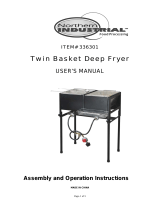
6
A number of commercial devices and materials are avail-
able to aid in eliminating fat impurities. There are sev-
eral excellent models of pressure filters as well as strainer-
type filters, which, if used regularly, will prolong life of
fat.
However, no purification device will renew broken down
or rancid fat or put new life into it. Once you have al-
lowed fat to break down it becomes unsuitable for fry-
ing — in fact browning is impossible.
In addition to filtration, you can prolong the usefulness
of fat by sweetening it with fresh compound every day -
replacing about 15% of the bulk you started with. If you
do enough frying so that normal absorption of fat in food
amounts to 15% to 20% of the capacity of your kettle
every day - then you can call that your turn-over food. It
means you can add the recommended 15% of fresh fat
without discarding any of the old.
In three to six months you may spend as much for fat as
you paid for your kettle. So fat is an item you want to
know all about; how to select it; how to manage it. The
more production you can get from each pound of fat,
the more profitable your frying operation will be.
To get a high rate of production per pound of fat you
have to avoid two things. One is early breakdown and
spoilage of the compound so that you have to throw it
away before it does enough work to "earn its keep." The
other is excessive sponging up of fat by the food being
fried.
The main cause of fat breakdown is excessive heat. On
the other hand abnormal absorption is caused by frying
too long at too low temperatures. One answer to both
problems is exact control of heat — so that fat neither
smokes up nor soaks up.
Of course, no fat "keeps" forever. Not only heat, but air
and moisture, salt particles and crumbs of food work to
break it down. But you can slow up fat deterioration by
maintaining proper temperatures and by draining your
kettle, filtering or straining the fat once or twice a day
and by keeping the kettle itself absolutely clean.
1. Choose a fat that does not break down quickly.
Hydrogenated shortening, corn, and peanut oils are
less likely to break down under high temperatures.
2. Do not fry foods at temperatures above those rec-
ommended. The higher the fat temperature, the
more rapid the rate of fat deterioration. Above
400°F fats quickly deteriorate.
3. During short intervals between frying, turn the heat
down. Do not keep heat on for long periods be-
tween batches.
4. Keep fat clean. Strain or filter daily or at end of
each shift. Add at least 15% fresh fat to your kettle
daily.
5. At least once a day, cool a small amount of fat and
taste it to see if it has picked up foreign flavors.
6. Discard fat that tends to bubble excessively before
food is added.
7. Do not overload baskets-pieces should not touch
when frying. Shake baskets to prevent food from
sticking together. Fry similar sizes together.
8. Never salt foods directly over fat, salt in fat re-
duces its life.
9. Raw, wet foods, such as potatoes and oysters,
should be drained or wiped dry before frying to
extend the life of the frying fat. Have foods to be
fried at room temperature.
10. Keep fat temperatures below smoking point to mini-
mize frying odors.
10 POINT PROGRAM
TO PRESERVE FAT AND PRODUCE THE FINEST FRIED FOODS
CARE OF FAT










